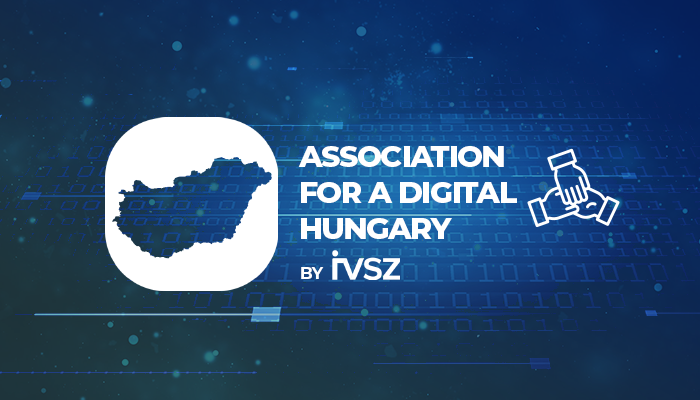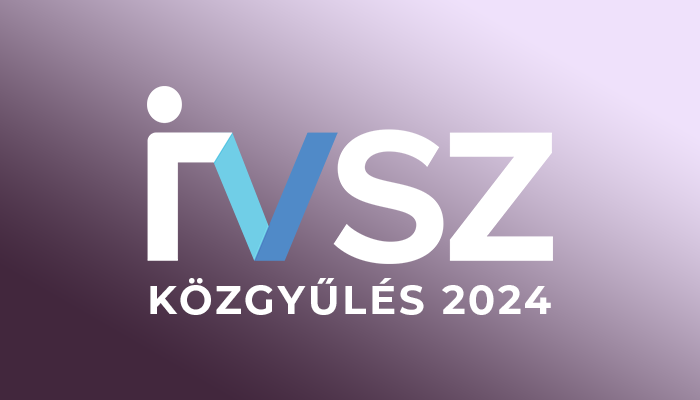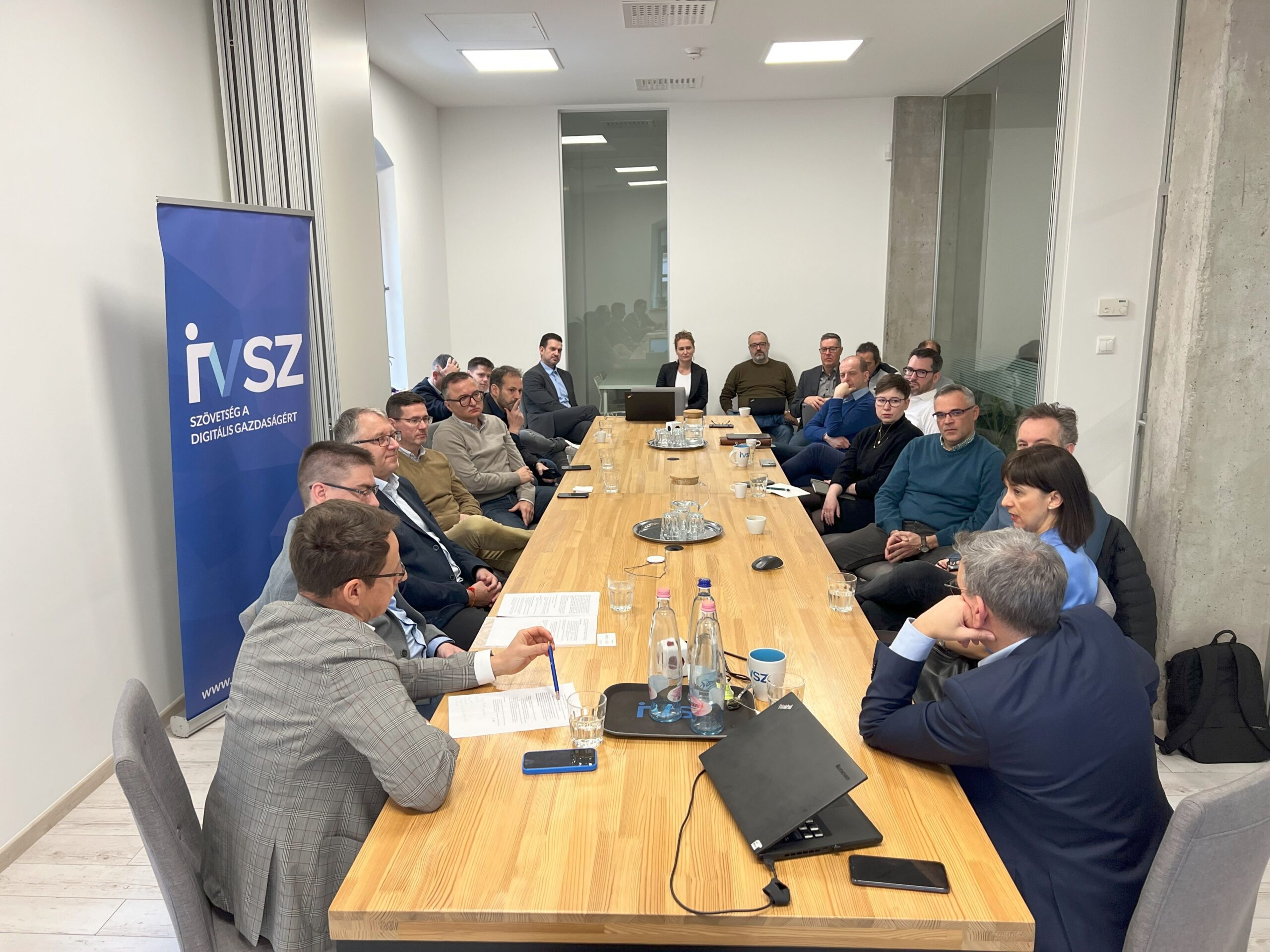Association for a Digital Hungary
Our last chance: a real digital turnaround!
Digitalisation has now reached the economy, education, healthcare – it has become an integral part of our everyday lives. Similar processes are taking place all over the world, and despite efforts in recent years, Hungary is lagging behind its competitors in many areas. In particular, the level of digital competencies is trailing the European average, but many actors in the economy and the public sector have also been slow to introduce and use effective digital solutions. Yet the stakes are huge: the competitiveness of the national economy and domestic businesses, the country’s economic performance and the quality of life of the population all depend on whether we can turn the inevitable digitalisation to our advantage in the coming years. It is not enough to drift with the tide of digitalisation – we must be at the forefront of the process! IVSZ, a group of digital economy players, is calling for a united voice for a digital Hungary and calls for action from all players in the digital ecosystem.

The industrial revolution in the 19th century led to global development because the most advanced countries understood that there was a need for a new type of labour. Politicians responded to the demands of the economy by introducing compulsory schooling, laying the foundations for a whole new, more competitive society. By bringing together economic and social actors, and with the active support of the government, we can turn our existing capabilities into a competitive advantage and jump to the forefront of digitalisation in the next few years. We used to think of digitisation as a task to be solved, but now we understand that it is in fact a historic, once-in-a-century opportunity. At the same time, it is perhaps the last chance for a long time to take the lead, because the future is always written by the winners.
There is no time to waste! Let us make the digital transition as soon as possible, enabling the green turnaround, increasing Hungary’s competitiveness and strengthening its resilience.
A strong, digital Hungary will play a significant role in improving the European Union’s global position.
- The digital transformation is not just an economic issue, it has a societal dimension: it can reduce or increase inequalities, contribute to sustainability and build resilience. For economic actors, the integration of digital technologies is vital, but the effective introduction of technologies will also significantly improve the quality of life of Hungarian citizens by transforming the healthcare, education and social sectors.
- Currently, the main obstacle to the development of the digital economy is the lack of IT and a digital workforce. In the field of infrastructure, we have built up a competitive advantage over the past decade through the cooperation of public and market actors, and the main challenge for the coming years is to maintain the favourable position we have achieved in this area. However, we need a similar joint effort in the digital transformation of public education, vocational training, adult education and higher education – i.e., the entire education system.
- In addition to addressing the dire digital labour shortage, raising the overall level of digital literacy of the population and among SMEs is a key condition for the competitiveness of the domestic digital economy. The proportion of workers with adequate digital skills in non-IT professions also needs to be significantly increased. It is therefore essential to launch mass programmes to develop digital competencies across all groups of the population.
- Let’s make digitalisation public! The user-friendly introduction of digital solutions and the effective sharing of the vast data assets at the disposal of the state with innovative technology companies and start-ups will improve both the quality of governance and the way citizens and businesses view the state.
- Let’s take the lead in regional digital cooperation and make the East-Central European region the engine of pan-European digitalisation! To this end, the V4 countries and their Central European partners need to harmonise their digitisation policies.
- For the growth of the Hungarian economy to follow a new, technology-driven path, the government needs to encourage and support the development of the digital ecosystem in every possible way, including
- opening up dedicated tender resources to boost innovation in ICT businesses and reducing administrative burdens;
- the ICT sector is already the second-largest export sector after the automotive industry – to develop it, targeted support should be provided to encourage digital firms to enter the global market and expand internationally;
- addressing the specific needs of the domestic start-up community to ensure the birth and internationalisation of Hungarian innovations;
- allocating adequate domestic and EU funds to accelerate digital development in all sectors of the economy;
- transparent monitoring of the use of public and EU funds for both private and public developments.
Digitalisation significantly affects the lives of every Hungarian, every Hungarian company and institution, and will fundamentally change our everyday lives in the coming years. To ensure that this transformation is of the greatest benefit to Hungarian citizens, businesses and ultimately the national economy, IVSZ calls for a digital transformation and joint action by all stakeholders.
We call on
- our member companies and all players in the digital economy to
- do their utmost to encourage the development of the digital competencies of their employees and the digital developments of their suppliers and partners;
- do their utmost to support the digital inclusion of their environment (e.g. digital upgrading of local education and training institutions), including through CSR programmes.
- professional organisations and major companies in each economic sector to
- focus on digital transformation and take advantage of its benefits;
- support professionals in their sectors and businesses to acquire interdisciplinary knowledge in the field of IT and digitalisation;
- consciously develop the digital skills of their employees.
- domestic micro, small and medium-sized enterprises to
- take advantage of every opportunity to accelerate their digital development and digital transformation;
- allocate labour market and business development funds to digital developments boldly and as much as possible;
- follow international digital best practices and innovative solutions in their own sector and adopt the elements that can be used.
- students in public education and vocational training to
- see the acquisition of digital competencies and knowledge not only as an opportunity but as a fundamental obligation for their future;
- not settle for social media, online games or IT skills that can be learned at school: sign up for robot programming, IT or science workshops, courses and competitions;
- find out what career options are available in IT, and what interdisciplinary training including digitalisation is available in other fields.
- parents and teachers to
- encourage and ensure the digital literacy of the next generation through their responsible behaviour and by all means;
- make programming and algorithmic thinking part of everyday education;
- present science and IT careers to students as a realistic and future-proof career option.
- from the workforce
- those who lack basic digital skills, so that they do not delay in developing their own skills, thus securing a place for themselves in the labour market of the future;
- workers who already have a basic level of digital skills to take part in further development programmes and acquire digital competencies at the highest possible level;
- those interested in IT and digital technology continuously strive to improve their digital skills and share their knowledge more widely.
- economic and public policymakers and all politicians to set the economy on a technological and knowledge-based growth path and to develop concrete programmes and projects to help realise the competitiveness, equal opportunities and sustainability potential of digitalisation.
We are launching a voluntary coalition called „ASSOCIATION FOR A DIGITAL HUNGARY”. Participants, coordinated by the IVSZ, will prepare an action plan and present it to decision-makers as policy and development proposals.
We cannot delay – we need a digital turnaround because this is our last chance!
Budapest, 23 September 2021.
Dr. Balázs Vinnai
President of IVSZ
Kapcsolódó
Ezek is érdekelhetnek

E-kereskedelmi almunkacsoport – A logisztika, mint stratégiai kérdés
Az IVSZ Export Munkacsoportján belül létrehoztunk egy E-kereskedelmi Almunkacsoportot, melynek keretein belül, egy előreláthatóan 4 alkalomból álló eseménysorozatot hirdetünk e-kereskedelmi témában...




